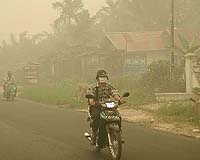| . |  |
. |
Montreal, Canada (SPX) Jun 11, 2009 Antibiotics, antimicrobials and antifungals are seeping into the waterways of North America, Europe and East Asia, according to an investigation published in the peer-reviewed journal Environmental Health Perspectives (EHP). Authored by Universite de Montreal and Environment Canada researchers, the review found that consumption of anti-infectives for human and agriculture use contributes to their release into the environment and even into drinking water. "Anti-infectives are constantly discharged, at trace levels, in natural waters near urban centres and agricultural areas," says senior author Sebastien Sauve, a Universite de Montreal professor of environmental analytical chemistry. "Their potential contribution to the spread of anti-infective resistance in bacteria and other effects on aquatic biota is a cause for concern." The research team compiled published data for three classes of antibiotics (macrolides, quinolones and sulfonamides) and the compound trimethoprim present in the urban wastewaters of East Asia, Europe and North America. The scientists found higher concentrations of these pharmaceuticals in raw wastewater compared to treated wastewater. "Rivers, creeks, lakes, estuaries, basins, sea waters and wells have been reported to be contaminated by several of these compounds," says Dr. Sauve, adding that a previous review by the scientific team also demonstrated that pharmaceuticals could promote microbial resistance when released in the environment. This latest review warns the increased farm usage of anti-infectives may augment their levels in future agricultural wastewater. The investigation also predicts that vital urban water conservation strategies could produce harmful side-effects - specifically less wastewater resulting in lower dilution and higher concentrations of anti-infectives in wastewater. "Anti-infectives might have a greater impact in developing countries, where sewage infrastructure can be lacking, over-the-counter drugs more widely available and industrial emissions less strict," adds first author Pedro A. Segura, a Universite de Montreal PhD student. Share This Article With Planet Earth
Related Links University of Montreal Our Polluted World and Cleaning It Up
 Indonesian hotspots flare, haze thickens: officials
Indonesian hotspots flare, haze thickens: officialsJakarta, Indonesia (AFP) June 16, 2009 More than 400 fires have been recorded burning in Indonesia's Riau province so far in June, a huge increase from the same time last year, officials said Tuesday. Smoke from the fires is causing haze that is drifting across neighbouring Malaysia, where authorities said Sunday air quality and visibility in some areas had fallen from "good" to "moderate" over the previous week. Most of the ... read more |
|
| The content herein, unless otherwise known to be public domain, are Copyright 1995-2009 - SpaceDaily. AFP and UPI Wire Stories are copyright Agence France-Presse and United Press International. ESA Portal Reports are copyright European Space Agency. All NASA sourced material is public domain. Additional copyrights may apply in whole or part to other bona fide parties. Advertising does not imply endorsement,agreement or approval of any opinions, statements or information provided by SpaceDaily on any Web page published or hosted by SpaceDaily. Privacy Statement |